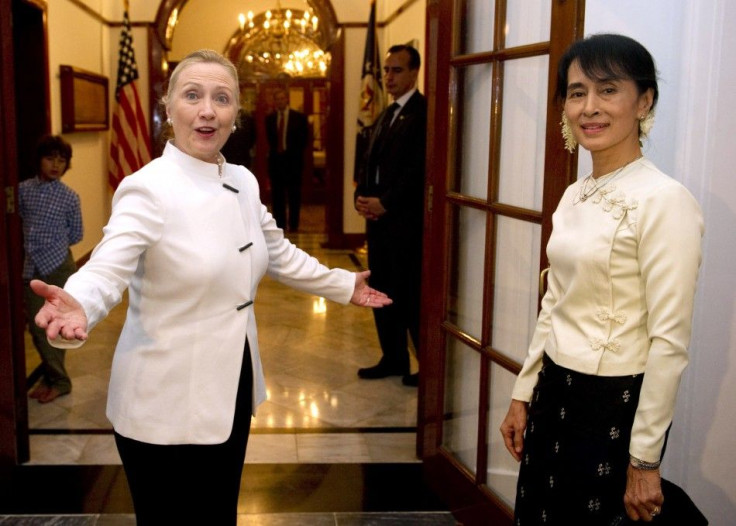Clinton's Myanmar Visit: Can Suu Kyi Work Magic After Election?

The initial signs from Myanmar, following U.S. Secretary of State Hillary Clinton's meeting with pro-democracy leader Aung San Suu Kyi and with the president Thein Sein, a former junta member, indicate a step in right direction.
I am very confident that if we work together... there will be no turning back from the road to democracy, Suu Kyi said after the talks with Clinton.
Despite the ongoing ethnic conflicts and complicated demands raised by ethnic minority leaders, including autonomy from the government, Myanmar is preparing for by-elections, which will pave the way for Suu Kyi to form a government.
Suu Kyi's Magic
Is Suu Kyi the magical answer to Myanmar's internal crisis?
Suu Kyi becoming President will trigger a new series of problems due to the diverse demands raised by different regions and ethnicities in the country, Athar Hussain, Director of Asia Research Center, London School of Economics, told IBTimes.
The minority leaders will prefer Suu Kyi over the military junta, but that doesn't mean that they will uncritically accept her, he said.
Problems will arise once Suu Kyi is elected to be the President and she will have to face the hard realities of Burmese politics, he said. What might happen after election is unpredictable, he added.
ASEAN's Gamble
Myanmar winning the approval to chair the regional bloc, Association of Southeast Asia Nations (ASEAN) in 2014, has been criticized as a risky strategy that could jeopardize participation of other nations.
Offering the 2014 chair of ASEAN, an important partner in international negotiation, to Burma was a major gamble, and I don't think it is ready to undertake such a major initiative, Hussain said.
According to Donald K. Emmerson, Director of Southeast Asia Forum at the Walter H. Shorenstein Asia-Pacific Research Center of Stanford University, the strategy is indeed risky, but it would be premature to call it a failure.
It is not risky enough to conclude that the strategy is likely to fail, if by failure we mean a boycott of ASEAN meetings in Burma chaired by the government there in 2014, Emmerson told IBTimes.
Assessing the Risks
Four things could raise the risk between now and then (2014): an intra-elite struggle inside Burma won by hardliners who reverse reforms, a protest followed by repression comparable to what happened to the Saffron Revolution in 2007, a dramatic escalation in repression of ethnic minorities, and a Republican administration in Washington committed to reversing Obama's accommodationist view, said Emmerson.
Given that Myanmar's problems are mostly internal, Clinton's visit may produce very limited results. The potential for change and the scale of such change are small. Events will be driven very largely by internal conditions, especially now that ASEAN has given up whatever leverage it might have retained by postponing a decision to give Myanmar the chair for 2014, said Emmerson.
Threat to China?
Ever since Obama announced Clinton's Myanmar visit, on the sidelines of the ASEAN Summit in mid-November, speculation was rife that the country could be a potential U.S. ally in dealing with China, the rising Asian giant and the largest foreign holder of U.S. public debt.
China will interpret this with some trepidation, India with some relief, said Emmerson. But the visit means just what the Obama administration intended: that the United States places a high priority on good relations with ASEAN.
According to Emmerson, stability in Myanmar would open up doors for trade relations for the U.S. and China alike. If improved relations with the U.S. help to open, modernize, and stabilize Myanmar, making it easier to do business there, China too will benefit, he said.
That said, Myanmar's trading partner China do have reasons to worry about the former forging ties with the U.S. and the E.U. for bilateral trade. Burma wouldn't be dependent on China alone for trade, and that could be a reason for China to worry. But Chinese have got pragmatic, because they cannot put an end to the process, He discredited the rumors that the U.S. may have special interests in Myanmar's abundant natural gas resources: There is plenty of gas in the world, and I don't think natural gas is a crucial area of U.S. interest.
The U.S. engagement will definitely open doors for Myanmar to the outside world but there will not be a dramatic transformation, Hussain said, referring to Myanmar's ethnic conflicts, However Burmese realization that this (military rule) cannot go on like in the past is definitely important, he added.
© Copyright IBTimes 2024. All rights reserved.





















